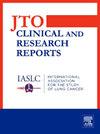基于单细胞测序分析的原发性肺NUT癌对BET抑制剂的完全缓解:一例报告
IF 3.5
Q2 ONCOLOGY
引用次数: 0
摘要
NUT癌是一种罕见的高侵袭性恶性肿瘤,其特点是进展迅速,对常规治疗有耐药性,预后极差。本文报道了一位36岁的IIIB期原发性肺NUT癌患者,他通过NHWD-870单药治疗(一种新型BET抑制剂)取得了显著的临床效果。仅在治疗1个月后,影像学显示部分缓解,并在5个月内达到完全缓解。术后病理检查证实无残留癌细胞,患者至今无复发或转移。为了探索这种治疗反应的潜在机制,对肿瘤组织进行了单细胞RNA测序,揭示了肿瘤微环境中免疫细胞,特别是效应CD8+ t细胞的活性增强。这表明NHWD-870通过直接抑制肿瘤和调节免疫微环境发挥作用。该病例强调了BET抑制剂治疗NUT癌的特殊疗效,首次报道的BET抑制剂单药治疗完全缓解证明了这一点,并支持其作为个性化治疗策略的潜力。本文章由计算机程序翻译,如有差异,请以英文原文为准。
Complete Response to BET Inhibitor in Primary Pulmonary NUT Carcinoma With Single-Cell Sequencing-Based Analysis: A Case Report
NUT carcinoma is a rare and highly aggressive malignancy characterized by rapid progression, resistance to conventional therapies, and an extremely poor prognosis. This report presents a 36-year-old patient with stage IIIB primary pulmonary NUT carcinoma who achieved remarkable clinical outcomes with NHWD-870 monotherapy, a novel BET inhibitor. After just 1 month of treatment, imaging revealed a partial response, and a complete response was achieved within 5 months. Postoperative pathologic examination confirmed no residual cancer cells, and the patient has remained disease-free without recurrence or metastasis to date. To explore the underlying mechanisms of this therapeutic response, single-cell RNA sequencing was performed on the tumor tissue, revealing enhanced activity of immune cells, particularly effector CD8+ T-cells, within the tumor microenvironment. This suggests that NHWD-870 exerts its effects through both direct tumor suppression and modulation of the immune microenvironment. This case highlights the exceptional efficacy of BET inhibitors in the treatment of NUT carcinoma, as evidenced by the first report of complete response achieved with BET inhibitor monotherapy, and supports their potential as a personalized therapeutic strategy.
求助全文
通过发布文献求助,成功后即可免费获取论文全文。
去求助
来源期刊

JTO Clinical and Research Reports
Medicine-Oncology
CiteScore
4.20
自引率
0.00%
发文量
145
审稿时长
19 weeks
 求助内容:
求助内容: 应助结果提醒方式:
应助结果提醒方式:


